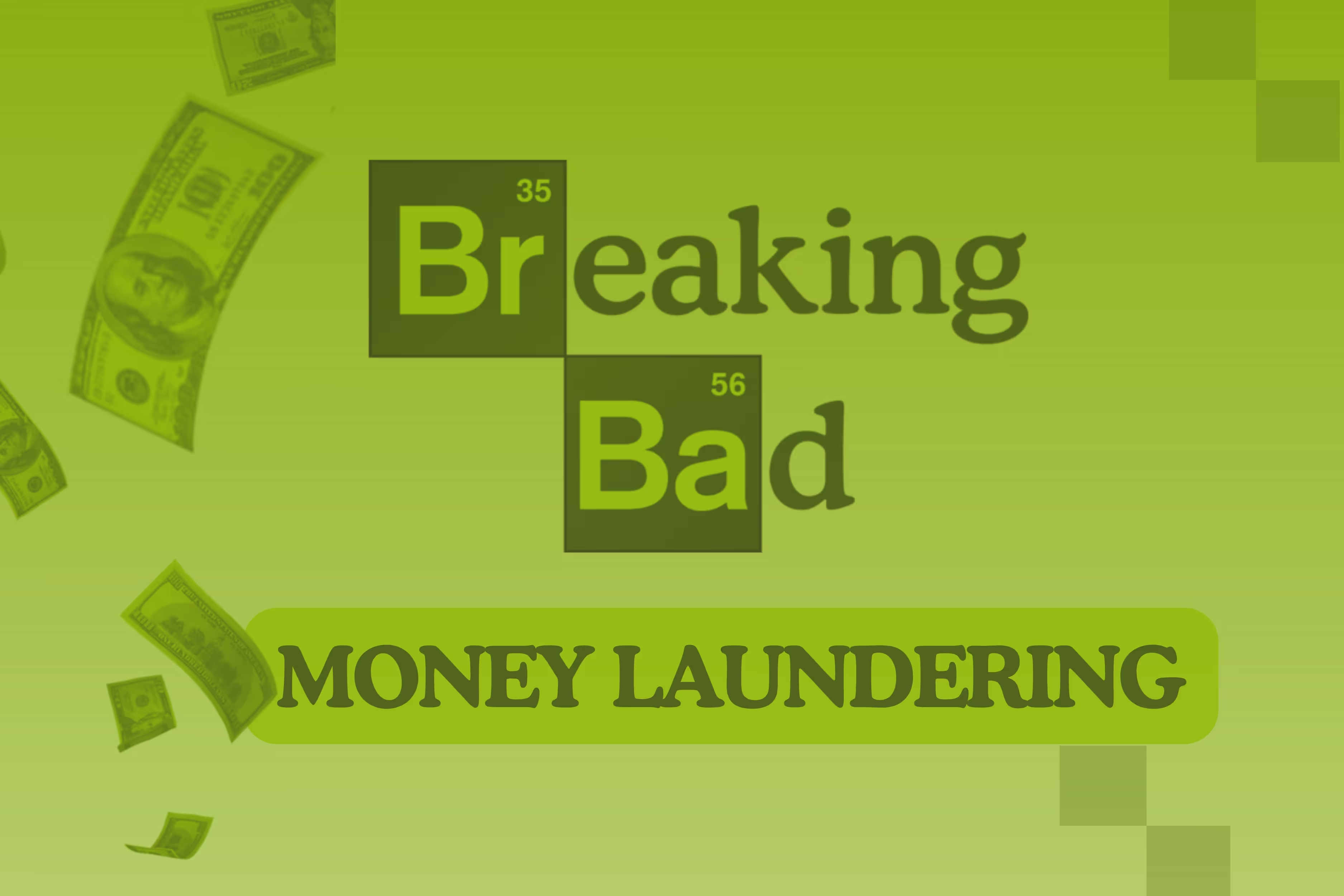
Criminals' Money Laundering Tactics Explained With Breaking Bad
Anti-money laundering (AML) professionals know this: The hit TV show Breaking Bad isn't an exact reflection of reality. But sometimes, an artistic license is required to explain complex topics to the average Joe watching Netflix. And are money laundering tactics complicated? Absolutely. Does Breaking Bad portray them effectively? Definitely. That's why this article will delve into some ways criminals launder their ill-gotten gains - all of which appear in the critically acclaimed American crime drama.
But before we reveal them, let's remind ourselves of the plot.
Breaking Bad: A Quick Overview
As many readers know, Breaking Bad, set in Albuquerque, New Mexico, chronicles the transformation of Walter White, a high school chemistry teacher, into a ruthless methamphetamine producer. While White is the protagonist, Jesse Pinkman is the show's deuteragonist who works with White.
Money laundering, especially in the elusive placement stage, is a prominent theme in the show. Why? Because White's journey into the criminal underworld involves the creation of illicit substances and the intricate process of legitimizing the illegal proceeds.
That said, we'll now reveal the money laundering tactics that appear in the drama.
Snapping Up Cash-Based Businesses
The most ubiquitous money laundering technique that Walt and his co-conspirators deploy in Breaking Bad is purchasing cash-based businesses. In popular culture, this form of cleaning illegally-gained funds is the most well-known and understood - which is perhaps why it features prominently in the show.
Simply put, this is how it works: dirty money is mixed with the legitimate income of a cash-based company, making it challenging for law enforcement to trace the illicit portion of the revenue.
It's a form of money laundering in the placement and layering stages (when criminals introduce profits from their crimes into the legitimate financial system and mix illegal and legal funds).
And who do Walt and Jesse call when they "have fat stacks and don’t know what to do with them"?
They call Saul.
Saul Goodman is a colorful but corrupt attorney who helps Walt and Jesse create elaborate schemes to clean their literal stacks of dollars. The character was so popular that a spin-off series, Better Call Saul, was released in 2013.
Thanks to Saul (well, in reality, Breaking Bad's excellent scriptwriters) the show features many cash-based businesses, such as:
- Car Wash (A1A Car Wash)
- Fast-Food Restaurants (Los Pollos Hermanos)
- Tortilla Factory
- Laser Tag Facility (Lazer Base)
- Pest Control (Vamanos Pest)
- Laundromat (Lavandería Brillante)
And the following businesses, although not taken up, were also discussed as potential cash-based money laundering operations:
- Car Rental Business
- Strip Club
- Vending Machine Business
- Zan Nail Salon (where Saul explained money laundering to Jesse)
You can watch this compilation video on Netflix's YouTube channel, showing every fake business in Breaking Bad.
Finding & Utilizing Professional Enablers
In the previous section, we alluded to the energetic, unscrupulous attorney (Saul Goodman) who assisted Walt and Jesse in laundering their dirty cash.
Saul became an anti-hero for Breaking Bad fanatics who saw beyond his corrupt exterior. While Saul is a criminal, his sharp wit, humorous demeanor, and occasional displays of empathy create a layered and intriguing character.
But now, let's get back to the reality of financial crime and away from Hollywood depictions.
Because the reality is this: Corrupt lawyers and accountants are often an essential cog in the money laundering process and is a tactic that sophisticated money launderers deploy.
Financial crime and governmental organizations describe individuals (such as the fictitious Saul Goodman) as professional enablers.
And Transparency International, the global coalition against corruption, states that professional enablers "are gatekeepers of the financial system whose willful, complicit, or negligent conduct can open closed doors for criminals to launder their illicit funds".
Professional enablers could include the following:
- Accountants
- Lawyers
- Tax Advisors
- Notaries
- Trust and Company Service Providers (TCSPs)
- Bankers
- Brokers
In Breaking Bad, Jesse finds Saul's contact information on a matchbook (free promotional matches) with the slogan "Better Call Saul!". The matchbook advertisement was likely passed around within criminal circles as a way to remember the corrupt lawyer's contact information.
But back to the real world.
On a much larger and more sophisticated scale, word-of-mouth likely also brought clients to the most infamous professional enabler of all time: Mossack Fonseca.
The firm received worldwide media attention in April 2016 when the Panama Papers revealed multi-billion dollar tax evasion and money laundering schemes running through the now-defunct company, shedding light on the involvement of drug cartels, influential individuals, politicians, and business magnates.
Recommended reading from the blog: Exploring Revealing Movies and Netflix Hits That Expose the Secrets of Money Laundering
Deploying Trade-Based Money Laundering Techniques
Here is an astonishing statistic: Trade-based money laundering (TBML) is estimated to account for $2 trillion of the annual $20 trillion in global trade.
So it's no surprise that TBML examples make their way into the Breaking Bad script.
As AML professionals know, TBML disguises illicit funds by manipulating trade transactions, invoices, and prices. Research from Global Financial Integrity (GFI), a Washington, DC-based think tank, focused on illicit financial flows and money laundering, found that misinvoicing was responsible for 63% of trade-based money laundering cases between 2011-2021.
But enough of the background information. How is misinvoicing portrayed in Breaking Bad?
In later seasons of the show, Walt's wife, Skyler White, works with Saul (the professional enabler) to inflate the car wash's expenses and underreport its income. This example is a classic case of the over-invoicing or false invoicing money laundering method.
By manipulating the car wash's financial records, Skyler creates a paper trail that makes it appear that the car wash is generating more income than it is. The excess income (Walt's drug money) is cleaned through the car wash's operations.
The above storyline is a domestic example. But Breaking Bad also alludes to an international TBML scenario involving the character Gustavo "Gus" Fring's lawful business operations.
Gus, a meticulous and calculating individual, operates a legitimate fried-chicken fast-food chain called Los Pollos Hermanos as a front for his drug empire. While the show doesn't explicitly dive into the theme, scenes imply that Gus might use his legitimate restaurants to facilitate the movement of illegal funds between the US and Mexico, where he operates distribution networks, using TBML techniques such as misinvoicing.
Bonus Example and How sanctions.io Helps With Money Laundering Prevention
The final money laundering technique to discuss in this article that Breaking Bad weaves into the script is this: Smurfing.
Walt, Jesse, and another associate, Mike Ehrmantraut, start struggling with a problem that all criminal groups with success encounter: Fat stacks (to use a term from the series).
Although the show never labels the technique as smurfing, splitting their fat stacks of their illegally-earned cash into multiple storage units aligns with the idea of smurfing (breaking down funds into smaller amounts).
About sanctions.io
Money laundering and sanctions evasion are connected. Why? Because sanctioned individuals and entities are high-risk money launderers. To learn more about ways to detect and prevent money laundering within your organization, Book a free Discovery Call.
We also offer a free 7-day trial (no credit card is required).
sanctions.io is a highly reliable and cost-effective AML screening solution. AI-powered and with an enterprise-grade API with 99.99% uptime are reasons why customers globally trust us with their sanctions, PEP, and criminal watchlist screening needs.
Enjoyed this blog article? Feel free to follow sanctions.io on LinkedIn to receive our blog updates.



